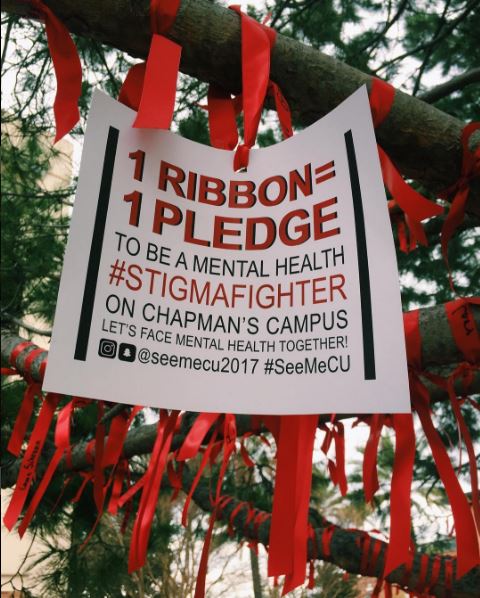Dodge Students Create Campaign to Face Mental Health Together
March 15, 2017
EDITOR’S NOTE: Five Dodge College students majoring in public relations and advertising (Mara Conway ’18, Sabina Hahn ’19, Katie Page ’19, Skye Sinyard ’18 and Allie White ’18) joined together to participate in this year’s Public Relations Student Society of America’s national Bateman Case Study Competition.
The team created a series of events, a Self-Help Fair, a Coffee + Community Night, and a Greek Life Mental Health Night to educate the campus and local community about the Five Signs of Emotional Suffering as identified by their client, Change Direction. Their innovative campaign received national notice in The Huffington Post.
“Mental illness is nothing to be ashamed of, but stigma and bias shame us all,” says former President Bill Clinton.
Whether you’re reading the news or watching a movie, mental health stigmas permeate American society. We hear the word “stigma” frequently in today’s society, but what exactly is stigma?
According to the Mental Health First Aid manual, stigmas are “a cluster of negative attitudes and beliefs that motivate that public to fear, reject, avoid, and discriminate against…[and] can negatively affect all areas of life — housing, employment, and, certainly, relationships.”
Going into this year’s Bateman competition, each member of our team connected with Change Direction’s mission for a similar reason — mental health and the stigmas surrounding it had affected all of our lives in one way or another.
We’d seen firsthand how mental health stigmas left us and our loved ones feeling isolated and handicapped.
For this reason, we built our campaign, “SeeMeCU,” around encouraging candid conversations about mental health, because one person’s “transparency” opens the door for others to also share openly.
During the research and development stage of SeeMeCU, we were worried people would be too scared to share their stories. Throughout the campaign, however, we were overwhelmed with the amount support and openness we received.

Almost every person we talked to — from Chapman students to Lowe’s employees — expressed how grateful they were for our campaign’s messages and goals.
“I’ve supported SeeMeCU because I’m super passionate about people having the correct knowledge about mental health issues and the correct tools to handle them. This campaign was my chance to let people know my own story and be proactive to make a difference,” says Bryan Macias, a junior Communication Studies major.
Our team realized a main cause of stigmas is a lack of education about mental health. To be better informed for ourselves, as well as for our communities, we took Mental Health First Aid USA’s eighthour program to become certified mental health “first aiders.”
The course taught us how to provide first aid to people dealing with depression, anxiety disorders, psychosis, substance use disorders, and eating disorders with its response plan ALGEE — assess for risk of suicide or harm, listen non-judgmentally, give reassurance and information, encourage appropriate professional health, and encourage self-help and other support strategies.
It also included interactive lessons about how to respond to suicidal behavior, non-suicidal self-injury, panic attacks, traumatic events, acute psychosis, overdose, and withdrawal.
We found ourselves using our new skills only hours after taking the course.
With mental health conditions being more common than heart disease, lung disease, and cancer combined (Mental Health First Aid USA), this course is pertinent to everyone.
We’d love to see this course offered on Chapman’s campus, but for now, if you’re interested in getting certified, visit https://www.mentalhealthfirstaid.org/cs/ to find a course near you. You also can check out the very thorough list of resources for depression, suicidal intentions, anxiety, psychosis, substance use disorders, and eating disorders, compiled by Mental Health First Aid on their website.


